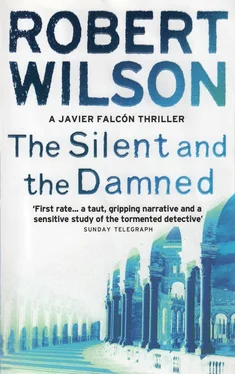Falcón said nothing. She wasn't looking for a reply.
'You witness something like that,' she said, flapping her hand in the vague direction of the prison, 'and you cannot imagine what has gone on in that man's mind. What has passed between him and his father. It was as if the news of his father's death went straight to the core of his being and ripped him open and out came all these incredibly powerful, uncontainable, polarized emotions. He was probably barely alive, just existing on automatic. He'd put himself in prison, in solitary confinement. His personal contact is almost zero. He's ceased to function as a human being, and yet the mind still has to find a way out.'
'Why do you think he's relieved to be there, as your friend was saying?'
'I suppose he'd got to the point where he was afraid of what his uncontrollable mind might do.'
'Do you think you can talk to him?'
'Well, I'm here at Sebastián's moment of crisis – his father's suicide – and I think we've formed a bond. If the prison authorities let me, I'm sure I can help him.'
'I know the prison director,' said Falcón. 'I'll tell him your work could be valuable to my investigation into Vega's death.'
'But you do think that there's a connection?' she said. 'This whole thing with Pablo… I can hear your brain chewing it over.'
'I know, but I'm just not sure what it is.'
He dropped Alicia Aguado off at her house and had another go at contacting Ignacio Ortega, whose mobile was still switched off. Consuelo called him and asked if he wanted to meet for lunch at Casa Ricardo, a bar halfway between her restaurant and Falcón's home. He decided to drop the car at home and walk. He parked between the orange trees and went to open the doors. As he reached for his keys a woman called to him from across the street. Maddy Krugman had just come out of a shop which specialized in hand-painted tiles. Her casual behaviour did not persuade him that this was an accidental meeting.
'So this is your house,' she said, as they stood between the two files of orange trees that led up to the wooden doors. 'The famous house.'
'The infamous house,' he said.
'That's my favourite shop in Seville,' she said. 'I think I'm going to take their entire stock back to New York with me.'
'Are you leaving?'
'No, not immediately,' she said. 'But in the end. You know, we all go back to where we started.'
He wasn't sure what she meant or that she knew either. He toyed with the possibility of wishing her well on her shopping trip and disappearing into his house, but he couldn't quite find the rudeness to do it.
'Would you like to see inside the infamous house?' he said. 'I could offer you a drink.'
'That's very nice of you, Inspector Jefe,' she said. 'I've been out shopping. I'm exhausted.'
They went in. He sat her down under the arches of the patio in front of the trickling fountain and went to fetch a bottle of La Guita and some olives. When he came back she was across the patio looking through the glass doors at some of Francisco Falcón's paintings of Seville.
'Are these…?'
'They're his real work,' he said, giving her a glass of manzanilla. 'He didn't have to cheat to do these. He was better than that, though. This was his subconscious mind belittling him. If he'd kept at it he'd have painted bare-breasted gypsies and doe-eyed children piddling into fountains.'
'What about your work?'
'I don't have any.'
'I read that you were a photographer.'
'I was interested in the concept of photography as memory,' he said. 'I had no talent for the art. What about you? How do you see it? What do you see as the point of photographing disturbed and anguished people?'
'What bullshit did I give you before?'
'I don't remember… probably something about capturing the moment,' said Falcón, remembering that, in fact, that had been his bullshit.
They walked back to the table. He leaned against a pillar. She sat, crossed her legs and sipped the manzanilla.
'I'm empathizing,' she said, and Falcón knew he wasn't going to hear anything that would make any difference to him. 'When I see people like that I remember the prison of my own anguish and the pain I caused Marty. There's an emotional response. I was surprised, once I started looking, how many of us there were out there. The shots are of individuals, but once you assemble them in a room they become like a tribe. They are an expression of the reality of the human condition. Shit – it doesn't matter how hard I try it always sounds like gallery talk. Don't you find that? Words have a way of flattening things out.'
He nodded, bored by her already. He wondered what Calderón. saw in her, apart from the blue veins under the white skin, cold as marble. This one was living life out as a project. Falcón stifled a yawn.
'You're not listening to me,' she said.
He came round to find her standing quite close to him, close enough for him to see the red blood spots in the green of her iris. She licked her lips, applying some natural gloss. Her sexuality, in which she was so confident, shimmered beneath the silk of her loose blouse. She moved her head, a slight tilt, to tell him that he could kiss her now, while her eyes said that this could turn into something frantic on the marble flags of the patio if he wanted. He turned his head away. He was slightly revolted by her.
'I was half listening,' he said, 'but I've got a lot on my mind and I'm meeting someone for lunch, so I should really be getting on.'
'I must go, too,' she said. 'I have to get back.'
Her hands trembled with rage as she picked up her bag of hand-painted tiles. He thought she might throw them at his head, one by one. There was something destructive in her nature. She was like a spoilt child who would break things just so that others couldn't enjoy them.
The walk to the front door was punctuated by the anger of her heels on the marble. She kept ahead of him so that he couldn't see her humiliation while she gathered up the fragments of the face she had lost and rearranged them into disdain. He opened the door, she shook his hand and headed off towards the Hotel Colón.
The Casa Ricardo was on Hernan Cortes at the meeting of three streets. It was a bar that could only exist in Seville, where the religious and the secular constantly rub shoulders. Every centimetre of the walls in the bar and small restaurant at the back was covered in framed photographs of the Virgin, the brotherhoods and all the paraphernalia of Semana Santa. The sound system played processional marches from Holy Week while people leaned against the bar drinking beers, eating olives and jamon.
Consuelo was waiting for him at a table in the back with a chilled half-bottle of manzanilla. They kissed each other on the mouth as if they'd been lovers for months.
'You look tense,' she said.
He tried to think of something other than Pablo Ortega, which he couldn't talk about.
'It's just developments. We keep finding things out about Rafael Vega that make him more of a mystery man.'
'Well, we all knew he was a secretive guy,' said Consuelo. 'I once saw him leave his house in his car, the Mercedes he had before he bought the Jaguar. And an hour later I was in town at a traffic light and this old dusty Citroen or Peugeot Estate pulls up alongside me and in the driver's seat was Rafael. If it had been anybody else I'd have knocked on the window and said hello, but with Rafael, I don't know… you just didn't intrude on Rafael.'
'Did you ever ask him about it?'
'First of all he never responded to direct questioning and, anyway, so what if he's in a different car? I just assumed it was an office car he used for going out to building sites.'
'You're probably right, it's nothing. You get to the point where every little thing has meaning.'
Читать дальше
Конец ознакомительного отрывка
Купить книгу












